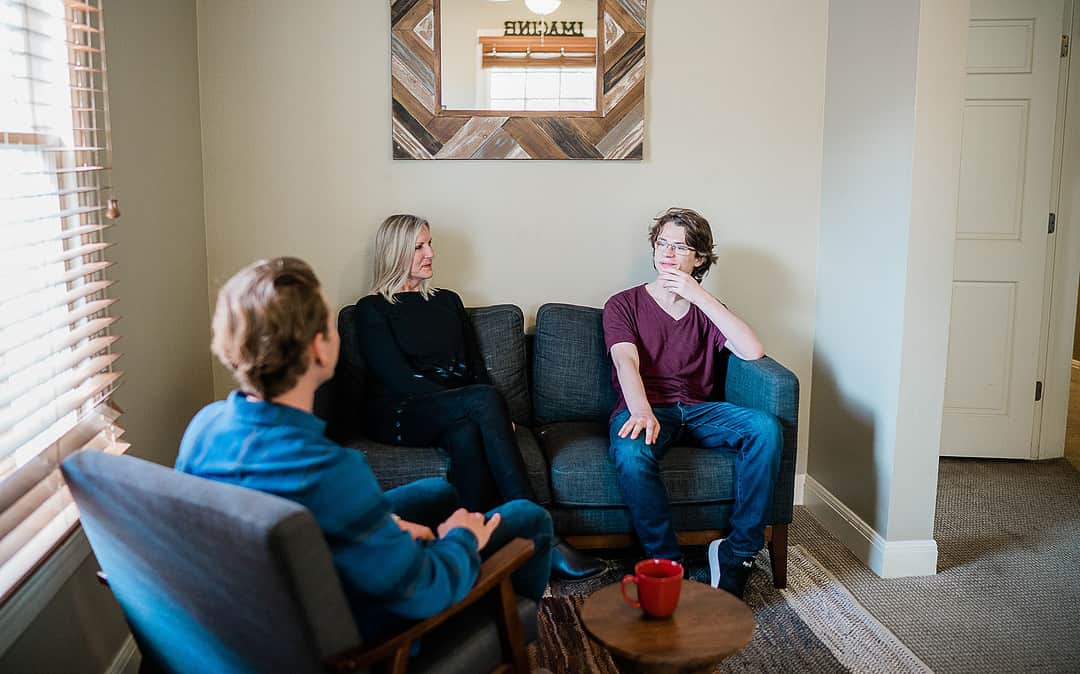Teens face various struggles, from school anxiety and relationships with peers to planning their future. Unmanaged stress can lead to unwanted substance use. However, following a few effective strategies and attending compassionate therapy at Alpha Behavioral Health can provide support for proper management. Teenagers can build new coping skills, boost confidence, and thrive academically and socially. Alpha Behavioral Health fosters a safe space for discussion and healing. We empower teens to overcome school anxiety and embrace their educational journey for a brighter future.
What Is School Anxiety?
It is natural for students to feel nervous about fitting in with peers or to excessively worry before taking a big exam. However, built-up anxiety can signal a deeper problem. Certain emotional, behavioral, or academic problems can hinder a teen’s ability to succeed. For example, some teenagers fear attending school due to bullying regarding their race or gender identity. LGBTQIA+ or racial discrimination can be emotionally painful. The degree of coursework, social cliques, public speaking, and dating can amplify excessive fear of failure, worry, and hopelessness.
What Causes Anxiety?
There is no direct cause of anxiety in young adolescents, teenagers, or young adults. Nevertheless, various factors play a wide role in poor mental health. Each individual’s background is truly unique. Genetics, past trauma, having a family history of psychiatric disorders, and stress can contribute to different anxiety disorders. Anxiety is not a label and should not define a teenager’s identity. Rather, feelings of anxiety are real and should not be taken lightly.
The Prevalence of School Anxiety in Teenagers Today
Research indicates that school anxiety among teenage students can disrupt academic performance, relationships, and family home life. Unaddressed anxiety symptoms can lead to severe issues such as eating disorders, substance use disorders, or even suicide. Numerous publications have also reported that anxiety is commonly linked with co-occurring depression in high school students. A wide body of research has highlighted that approximately 75% of chronic diseases can stem from an individual’s upbringing. Thus, anxiety prevention programs are of paramount importance and are often integrated into school programs. Doing so promotes reduced anxiety and helps children gain access to mental health services.
The Link Between Social Anxiety and Substance Use Disorder
Youth and teens are less likely to come forth about their struggles. It is common for teens to harbor tough emotions as they feel no one can understand what they are going through. Some teenagers and even parents confuse puberty with poor mental health. Others find it hard to fit in as they may struggle to understand their gender identity.
Teenagers, in general, feel lost navigating their identity and sole purpose in life. When a teenager suppresses their emotions for a prolonged period, they often take the situation into their own hands and resort to drug or alcohol abuse. This may be done in hopes of numbing past trauma or current social or emotional conflicts with peers. However, the effects of drugs and alcohol are temporary and worsen one’s subjective well-being. Substance use can lead to severe substance use disorder (SUD). If the condition is left unmanaged, teens put themselves at risk of enduring a disability, coma, or even death.
Symptoms of School Anxiety
It can be hard to detect the warning signs of school anxiety. However, unaddressed anxiety can significantly disrupt a student’s academic performance as well as their ability to function daily. School anxiety can also be stressful for a teenager’s parents or caregivers. Nonetheless, learning to recognize the signs and symptoms of school anxiety can improve one’s mental health and aid in relapse prevention. Common signs to look for in a teenager include:
- Persistent headaches, stomach aches, or overall feeling sick
- Having sweaty hands, palms, armpits, or feet
- Experiencing a racing heart or fast-paced breathing
- Having night terrors or insomnia
- Avoiding school activities
- Finding it difficult to concentrate during class
- Avoiding getting ready for school
- Experiencing difficulty completing homework
- Seeking constant reassurance from teachers, family, or friends
- Finding it difficult to transition from home or school
Overcoming Peer Pressure
As if academic challenges, social anxiety, and stage fright were not hard enough, peer pressure can be even more problematic for some teenagers. Negative peer pressure involves more than just using drugs or alcohol. Many teens get wrapped up in reckless driving, stealing from family members, shoplifting, or other types of criminal behavior. Spending time with the wrong crowd can also lead teens to bully individuals, dress inappropriately, and act out in a certain way.
The Negative Impact of Social Media on a Teen’s Mental Health
Teens today spend about three hours of screen time a day. According to the U.S. Department of Health and Human Services (HHS), approximately 95% of youth aged 13-17 browse and have a social media account. Studies indicate that about one-third of teenagers are actively on social media. Those who spend more than the average amount are at a two-fold risk of developing mental health disorders such as depression or anxiety. Social media influencers negatively impact teenagers’ well-being. The internet also puts one at risk of cyberbullying. Peers can post personal or private information that can cause great humiliation. Posts, comments, and emotionally abusive messages can also contribute to problems with school anxiety.
The Importance of Good Mental Health for a Happier Future
Teenagers with good mental health are more motivated to head to school, actively participate in group activities, develop healthy connections with both adults and peers, and use appropriate coping mechanisms for stability. Individuals who display non-aggressive behaviors mark a good example for others. A positive school culture is so important. Teenagers who are happy and thriving focus better on their studies. Therefore, they get better grades, receive grants and scholarships, and are more likely to get accepted to their desired college campus. No individual is perfect. Unexpected, unfortunate events do occur. However, proper management can help one achieve their future goals for a better quality of life.
Overcoming Social Anxiety With Extra-Curricular Sober Activities
It can be challenging to overcome school anxiety. For example, some teenagers feel consumed by their social anxiety. Breaking the ice can be an intimidating first step. Group activities can feel very uncomfortable. Finding a place to sit at lunch can be daunting. Mingling with peers at football games or simply walking to the front of the classroom can be nerve-wracking. Feeling self-conscious or constantly worrying about being the center of attention can rob one of their true self.
Although many teenagers with social anxiety commonly refrain from social events altogether and keep to themselves, gradually participating in extra-curricular activities can, in turn, help. The more one throws oneself into a social situation, the more comfortable one may become around peers. Childhood trauma can interfere with one’s self-worth, ultimately making it harder to engage with peers. However, seeking professional treatment along with positive encouragement from loved ones can help one gain better social skills.
Effective Self-Help Strategies to Safely Manage the Effects of School Anxiety
Understanding that school anxiety can derail a teenager’s academic performance, cause digestive problems, and keep one up at night, self-help strategies can be beneficial. For example, mentally and physically preparing the night before can improve an individual’s anxiety symptoms. School preparation is more than just picking out an outfit. Touring a new campus can help one acclimate to their new school setting.
Students who have been attending the same school for a certain number of years can meditate before bed, practice mindfulness, call a friend, journal feelings, or take notes. Planning a special breakfast can also ease one’s digestive issues linked with anxiety. Walking to school with a close friend or organizing projects with someone close can make school activities more fun. It is always okay to take a few minutes to recuperate in moments of panic before walking back into a busy school environment. Additional tips to manage anxiety during the school year include:
- Talking with a school counselor for support
- Getting outside for fresh air
- Staying busy to remain focused
- Aiding hydration to ease symptoms
- Saying mantras or self-affirmations
How Does Alpha Behavioral Health Empower Teenagers to Overcome School Anxiety?
Even though self-help strategies can make a slight difference, surrendering to professional care can be highly beneficial for teenagers who are experiencing deeper challenges. Alpha Behavioral Health offers a variety of services to provide wraparound care for teens and their families. Many teenagers can be resistant to therapy, which is why Alpha Behavioral Health’s mental health team has designed everything with them in mind. The therapists at the Austin Teen Mental Health Treatment Center work closely with their clients to create a treatment plan. Their focus is to not only help their clients regain stability but also go on to accomplish their desired goals and live their best lives. Teen mental health treatment addresses:
- Major depressive disorder
- Anxiety disorders
- Process addictions
- Substance use disorder
- Family/parental conflicts
- Post-traumatic stress disorder (PTSD) and overcoming trauma
- Education planning
- LGBTQIA+ life experiences
Benefits That Can Come From Moving Forward With Individual Therapy
Anxiety and co-occurring mental health problems such as substance use disorders, depression, PTSD, and more can be weighing. However, one-on-one psychotherapy can significantly improve a teenager’s dual diagnosis. Individual therapy at Alpha Behavioral Health can provide a more focused approach to care. During individual therapy sessions, the therapist helps clients explore their thoughts, feelings, and behaviors in a safe environment.
Alpha Behavioral Health is a lifestyle support organization known for its dedication to guiding individuals through the complexities of mental health and addiction challenges. Their compassionate therapists teach the coping mechanisms needed to help manage school anxiety. Individual therapy is completely confidential and allows individuals to work with their therapist at their own pace. Therapy can help teenagers become more accountable for certain behaviors, help them understand and set healthy boundaries, and aid in conflict resolution for improved mental health and ongoing improvement.
Breaking Down Different Therapy Options at Alpha Behavioral Health to Overcome School Anxiety
Finding the right treatment center can be an overwhelming process. The start of care can also bring on a whirlwind of emotions for students and their family members. Alpha Behavioral Health provides individual therapy, intensive outpatient treatment options, and its Launch Program to assist teenagers who are seeking much-needed support. Their team understands that teenagers’ anxiety and fears derive from unique circumstances.
Therefore, opening up to a stranger can be a challenging process. Their Master Level Clinicians are passionate about getting to know each of their clients. They incorporate creative modalities to help them learn to express themselves confidently. Behavioral therapy options at Alpha Behavioral Health include:
- Cognitive behavioral therapy (CBT)
- Dialectical behavior therapy (DBT)
- Eye movement desensitization and reprocessing (EMDR)
- Mindfulness-based approaches
- Solution-focused brief therapy
- Art and experiential modalities
- Psychodynamic therapy
- Attachment therapy
- Family therapy
- Motivational interviewing
The Importance of Fostering a Safe Space for Teenagers Yearning to Heal
A poor childhood upbringing can involve traumatic experiences. Children may face problems overcoming sexual abuse, emotional abuse, physical abuse, exposure to domestic violence, drugs or alcohol, natural disasters, or more. Knowing that childhood trauma can increase one’s risk of developing mental health problems such as depression or anxiety disorders, a safe treatment environment is important. Alpha Behavioral Health fosters a safe space for teenagers and young adults who are yearning to overcome anxiety. Confidentiality in therapy sessions helps build trust between the client and the therapist, creating a safe space to explore thoughts, feelings, and experiences openly and without fear of judgment.
The Pressure of Planning a Bright Future
Certain pressures from loved ones and planning for life after school, such as college, work, or the thought of supporting their family on their own, can be mentally draining. All teenagers face some form of pressure when planning for their future. However, the rate of intensity can depend on an individual’s family success, cultural background, or family bond in general. Some parents or caregivers push their children to succeed in school to run their family business, play professional sports, or get accepted at accredited college universities. Nevertheless, loved ones only want the best for their children. Rather, planning a bright future should bring more comfort, light encouragement, and overall less stress.
How Can Alpha Behavioral Health Launch Life Skills Development & Case Management Help?
Alpha Launch’s success management strategy goes beyond the conventional service model. Their care team places a strong emphasis on proactive planning, goal setting, and continuous support throughout their client’s healing journey. Daily stressors such as juggling a busy schedule, financial management, and making healthy friends can further compound the issues that young individuals may experience as they navigate the complexities of early adulthood. Alpha Behavioral Health understands that certain complexities can feel discouraging. Their Alpha Launch program helps with life skills development to promote growth, resilience, and improved overall well-being. Areas of support include:
- Case management
- Social support
- Individual therapy
- Executive function coaching
- Life skills development
- Academic support
- Career coaching
Easing Into a Brighter Future With the Alpha Behavioral Health Transitional Living Program
Recovering from school anxiety and co-occurring mental health conditions can come with certain obstacles. For example, it is highly common for teenagers and young adults to relapse within the first year after completing their addiction treatment program. Life stressors, new unfortunate events, and poor relationships with family and friends can hinder one’s ability to maintain mental stability.
Fortunately, the Alpha transitional living program is an immersive aftercare experience designed to provide young men with all the tools they need to succeed in recovery. Recovery cannot be taught; it must be experienced. Their recovery community is specifically designed to help young men transition into a new way of life without depending on substance abuse or process addiction to cope. Alpha Behavioral Health’s integrated approach, other than the launch program, includes:
- Austin Residences: Single-occupancy rooms, gym membership, downtown amenities, workspace
- Recreation: Hiking, golfing, paintball, wakeboarding, white water rafting, paddle boarding, etc.
- Family Support: Family therapy, recovery education, virtual support groups, etc.
At Alpha Behavioral Health, our Austin individual counseling team empowers individuals to navigate through life’s ups and downs with strength and resilience. Through counseling, personalized support, and evidence-based practices, clients are encouraged to explore their inner selves, identify their goals, and work toward them to overcome school anxiety. We believe teens, young adults, and their families deserve an environment specifically cultivated for their unique needs. While it can be scary and overwhelming when teens are struggling with mental health or addiction issues, at Alpha Behavioral Health, we believe in the upside of healing. Call Alpha Behavioral Health at (833) 257-4218 to gain the support needed for a safe, bright, and happy future.






